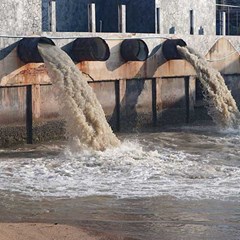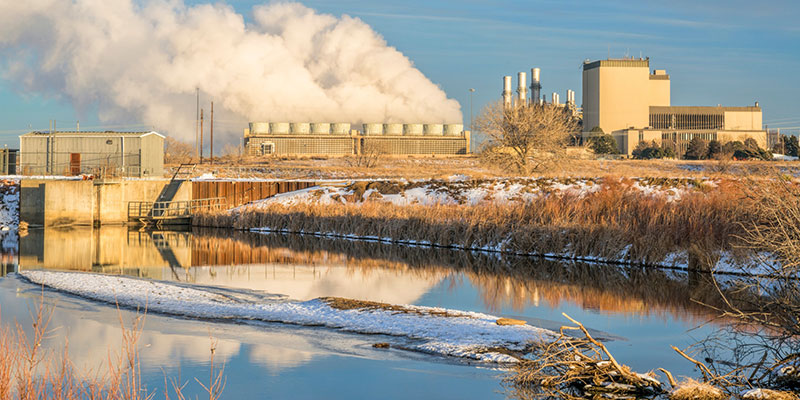Industrial Waste Water Treatment-- Cutting-Edge Technologies for Water Filtration
Industrial Waste Water Treatment-- Cutting-Edge Technologies for Water Filtration
Blog Article
The Role of Industrial Waste Water Therapy in Environmental Security
The reliable therapy of commercial wastewater is significantly recognized as a cornerstone of ecological security, serving to minimize the damaging effects of toxins on marine environments. As markets develop and broaden, the demand for durable wastewater monitoring options ends up being paramount to make sure conformity with ecological guidelines and promote sustainable methods.
Importance of Drainage Treatment
The significance of wastewater therapy can not be overemphasized, as it plays an essential role in shielding public health and wellness and the setting (Industrial Waste Water Treatment). Effective wastewater therapy systems are vital for eliminating contaminants from commercial discharge, thus preventing damaging materials from going into all-natural water bodies. This process minimizes the risk of waterborne conditions, which can occur from neglected wastewater, and safeguards community health
In addition, treated wastewater can be safely recycled in various applications, such as irrigation and commercial procedures, promoting sustainable water monitoring techniques. By reusing water, markets can dramatically minimize their freshwater intake, contributing to source conservation.
Along with health advantages, wastewater therapy is essential for preserving marine ecosystems. Pollutants in untreated wastewater can cause the deterioration of water top quality, harming water life and interrupting eco-friendly balances. By dealing with wastewater before discharge, sectors help preserve the honesty of local environments and promote biodiversity.
Moreover, regulative conformity is a key aspect of wastewater monitoring. Abiding by recognized ecological requirements not only stays clear of lawful repercussions but likewise improves a firm's online reputation as a responsible company citizen. Fundamentally, reliable wastewater treatment is essential for safeguarding public health, securing the environment, and promoting sustainable commercial practices.

Resources of Industrial Waste Water
Industrial wastewater stems from a variety of resources, each adding to the intricacy of treatment procedures. Predominantly, these resources consist of producing centers, refineries, and processing plants, which create effluents as a result of their procedures. Industries such as textiles, pharmaceuticals, food and beverage, and petrochemicals generate substantial volumes of wastewater, often laden with impurities consisting of hefty steels, organic compounds, and nutrients.
In enhancement to manufacturing, agricultural tasks add to commercial wastewater through drainage and effluent from livestock operations and plant handling. The meat and dairy sectors, specifically, are known for launching high degrees of biochemical oxygen demand (FIGURE) and microorganisms.
Furthermore, mining and mineral processing tasks create wastewater consisting of put on hold solids and hazardous chemicals. Power generation plants, specifically those utilizing nonrenewable fuel sources, also add wastewater via cooling down systems and chemical cleaning processes.
Each of these resources presents distinct obstacles regarding the make-up and volume of wastewater generated, necessitating customized therapy options to minimize their environmental effect. Recognizing the varied beginnings of industrial wastewater is necessary for creating effective monitoring approaches targeted at safeguarding water sources and promoting sustainable industrial methods.
Therapy Procedures and Technologies
Effective treatment processes and modern technologies are vital for handling industrial wastewater and mitigating its ecological effect. Various techniques are utilized to eliminate impurities, adjust to various wastewater characteristics, and follow regulative standards.
Physical treatment procedures, such as sedimentation and filtering, assist in the elimination of suspended solids. These methods are frequently used as preliminary steps to lower the load on succeeding therapy phases. Chemical treatment, consisting of flocculation, neutralization, and coagulation, addresses dissolved pollutants by modifying their chemical residential properties, making them less complicated to divide from water.
Organic therapy innovations, such as activated sludge systems and biofilters, utilize microbes to deteriorate raw material and nutrients. These approaches are specifically effective for biodegradable waste streams, advertising the all-natural decomposition process. Advanced therapy modern technologies, such as membrane purification and progressed oxidation processes, offer improved removal performances for difficult pollutants, including hefty steels and persistent organic substances.
Each of these therapy processes can be set up in different mixes to create customized remedies that fulfill details industrial needs. The choice of technology depends upon elements such as Learn More Here the type of wastewater, wanted therapy results, and financial factors to consider, making sure that markets can operate sustainably while lessening their eco-friendly impact.
Ecological Benefits
Carrying out robust wastewater treatment refines not just makes sure conformity with governing criteria however likewise yields significant environmental benefits. Reliable treatment of commercial wastewater minimizes the discharge of unsafe pollutants right into natural water bodies, therefore safeguarding marine ecosystems. By getting rid of hazardous compounds, heavy visit this site right here steels, and microorganisms, these procedures help keep biodiversity and advertise healthier communities.
Furthermore, dealt with wastewater can be repurposed for various applications, consisting of irrigation and commercial procedures, lessening the demand for fresh water sources. This reuse not just preserves water yet also minimizes the stress on local water products, which is specifically critical in water-scarce regions.
Moreover, effective wastewater therapy alleviates the danger of soil and groundwater contamination, making sure the integrity of neighborhood environments. Industrial Waste Water Treatment. By protecting against the infiltration of hazardous materials, sectors add to the general wellness of surrounding neighborhoods and ecosystems, improving public trust fund and cultivating lasting industrial practices
Regulatory Framework and Compliance
A thorough regulative structure regulates the treatment of commercial wastewater, ensuring that industries adhere to stringent conformity standards. Various nationwide and regional regulations, such as the Clean Water Act in the United States, established forth restricts on the discharge of contaminants into water bodies. These regulations are made to secure water ecological communities and public health and wellness by mandating that industries implement suitable therapy technologies.
Conformity with these policies typically includes acquiring permits, carrying out normal surveillance, and reporting discharge levels to regulatory authorities. Failure have a peek at this website to abide can cause significant fines, consisting of penalties and functional constraints, consequently incentivizing sectors to embrace best techniques in wastewater monitoring.
Along with governmental regulations, many markets additionally stick to volunteer standards and accreditations, such as ISO 14001, which advertise sustainable ecological administration methods. Stakeholders are increasingly advocating for improved openness and liability in wastewater monitoring, pressing for stricter enforcement and even more strenuous reporting needs.
Inevitably, a robust regulatory framework not just serves to mitigate environmental dangers yet likewise cultivates a culture of sustainability within the commercial market, motivating continuous improvement in wastewater therapy procedures.
Final Thought

The reliable therapy of commercial wastewater is significantly acknowledged as a cornerstone of ecological defense, serving to alleviate the damaging impacts of toxins on aquatic communities. Efficient wastewater treatment systems are important for removing contaminants from industrial discharge, consequently preventing hazardous materials from getting in natural water bodies.Industrial wastewater stems from a range of resources, each contributing to the intricacy of treatment processes. Reliable therapy of commercial wastewater reduces the discharge of hazardous toxins right into all-natural water bodies, therefore securing aquatic communities.In conclusion, industrial wastewater therapy is essential for securing environmental honesty and advertising sustainable water administration.
Report this page